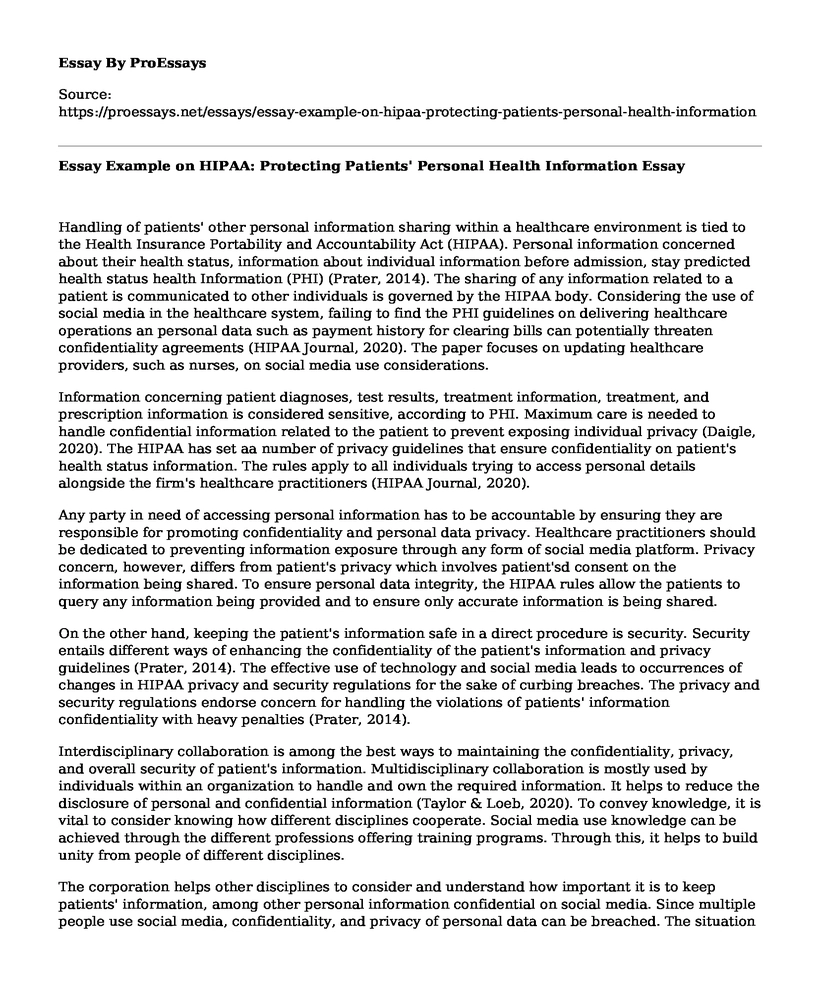Handling of patients' other personal information sharing within a healthcare environment is tied to the Health Insurance Portability and Accountability Act (HIPAA). Personal information concerned about their health status, information about individual information before admission, stay predicted health status health Information (PHI) (Prater, 2014). The sharing of any information related to a patient is communicated to other individuals is governed by the HIPAA body. Considering the use of social media in the healthcare system, failing to find the PHI guidelines on delivering healthcare operations an personal data such as payment history for clearing bills can potentially threaten confidentiality agreements (HIPAA Journal, 2020). The paper focuses on updating healthcare providers, such as nurses, on social media use considerations.
Information concerning patient diagnoses, test results, treatment information, treatment, and prescription information is considered sensitive, according to PHI. Maximum care is needed to handle confidential information related to the patient to prevent exposing individual privacy (Daigle, 2020). The HIPAA has set aa number of privacy guidelines that ensure confidentiality on patient's health status information. The rules apply to all individuals trying to access personal details alongside the firm's healthcare practitioners (HIPAA Journal, 2020).
Any party in need of accessing personal information has to be accountable by ensuring they are responsible for promoting confidentiality and personal data privacy. Healthcare practitioners should be dedicated to preventing information exposure through any form of social media platform. Privacy concern, however, differs from patient's privacy which involves patient'sd consent on the information being shared. To ensure personal data integrity, the HIPAA rules allow the patients to query any information being provided and to ensure only accurate information is being shared.
On the other hand, keeping the patient's information safe in a direct procedure is security. Security entails different ways of enhancing the confidentiality of the patient's information and privacy guidelines (Prater, 2014). The effective use of technology and social media leads to occurrences of changes in HIPAA privacy and security regulations for the sake of curbing breaches. The privacy and security regulations endorse concern for handling the violations of patients' information confidentiality with heavy penalties (Prater, 2014).
Interdisciplinary collaboration is among the best ways to maintaining the confidentiality, privacy, and overall security of patient's information. Multidisciplinary collaboration is mostly used by individuals within an organization to handle and own the required information. It helps to reduce the disclosure of personal and confidential information (Taylor & Loeb, 2020). To convey knowledge, it is vital to consider knowing how different disciplines cooperate. Social media use knowledge can be achieved through the different professions offering training programs. Through this, it helps to build unity from people of different disciplines.
The corporation helps other disciplines to consider and understand how important it is to keep patients' information, among other personal information confidential on social media. Since multiple people use social media, confidentiality, and privacy of personal data can be breached. The situation would put the patient whose information was exposed to significant risks-the person who discloses the data is also faced by the threat of substantial consequences (Moore & Frye, 2020). Offering lessons and training different personnel on the information to expose or not expose on social media concerning patients is the right step.
Conclusion
In conclusion, protecting the health information handled under the privacy laws provided by HIPAA needs to understand the extension to which confidentiality, security, and privacy of information should be maintained or adhered to.
References
Daigle, A. (2020). Social media and professional boundaries in undergraduate nursing students. Journal of Professional Nursing, 36(2), 20-23. https://www.sciencedirect.com/science/article/pii/S8755722319301279
HIPAA Journal. (2020). HIPAA Privacy Laws. HIPAA Journal. Retrieved from: https://www.hipaajournal.com/hipaa-privacy-laws/
HIPAA Journal. (2020). What is Considered Protected Health Information Under HIPAA? HIPAA Journal. Retrieved from: https://www.hipaajournal.com/what-is-considered-protected-health-information-under-hipaa/
Moore, W., & Frye, S. (2020). Review of HIPAA, part 2: limitations, rights, violations, and role for the imaging technologist. Journal of Nuclear Medicine Technology, 48(1), 17-23. https://www.sciencedirect.com/science/article/pii/B9780128165430000066
Prater, S, V. (2014). Confidentiality, privacy, and security of health information: Balancing interests. Retrieved from: https://healthinformatics.uic.edu/blog/confidentiality-privacy-and-security-of-health-information-balancing-interests/Taylor, J., & Loeb, S. (2020). Guideline of guidelines: social media in urology. BJU international, 125(3), 379-382. https://onlinelibrary.wiley.com/doi/abs/10.1111/bju.14931
Cite this page
Essay Example on HIPAA: Protecting Patients' Personal Health Information. (2023, May 30). Retrieved from https://proessays.net/essays/essay-example-on-hipaa-protecting-patients-personal-health-information
If you are the original author of this essay and no longer wish to have it published on the ProEssays website, please click below to request its removal:
- Women Finally Speak: Oprah's Speech Analysis
- Pharmacological Management of Drugs Used in Treating Infectious Diseases Paper Example
- Essay Sample on HIM & HIT: Enhancing Quality of Care Through Data Use
- Essay on Crime Prevention Strategies: Enhancing Security with CPTED
- Essay on Chronic Fatigue & Chest Pain: Heterogeneous Presentation Requires Patient's Perspective
- Obesity: A Growing Health Issue in the US - Essay Sample
- Essay Sample on Interprofessional Collaboration: Enhancing Patient Care & Reducing Medical Errors







